IN THE EYE OF THE HURRICANE
In
the
Indian
Ocean,
hurricanes
are
aptly
called
“cyclones,”
from
the
Greek
word,
kuklos
,
meaning
“circle,”
because
their
winds
rotate
around
a
center
point
known
as
“the
eye.”
If
the
eye
of
a
hurricane
moves
directly
over
a
person,
he
finds
himself
in
calm
weather.
If
he
didn’t
know
any
better,
he
might
think
that
the
calm
of
the
hurricane’s
eye
was
just
another
pleasant
day.
Yet,
the
eye
of
the
hurricane
soon
moves
on
and
he
is
hit
by
the
fierce
and
devastating
wall
of
wind
on
the
other
side.
The
calm
he
experienced
in
the
eye
proved
to
be
just
an
illusory
interlude
—
a
brief
“lull
before
the
storm.”
Therefore,
he
would
be
a
fool
to
think
that
the
calm
of
the
hurricane’s
eye
means
that
the
worst
is
over
and
that
he
may
return to life as it was.
Such
is
life.
It
is
like
a
hurricane
with
its
eye.
Its
problems
come
and
go
—
and
come
again.
Life
involves
encountering
and
resolving
an
unending
series
of
problems.
Not
only
are
there
smaller
category
one
and
two
“hurricanes,”
but
there
are
the
intermediate
category
threes
and,
sometimes,
even
the
category
fours
and
fives.
When
life’s
problems
or
crises
hit,
we
move
through
the
“eye
wall”
of
a
storm
before
God,
in
His
great
mercy,
gives
us
the
calm
of
“the
eye”
to
catch
our
breath
and
prepare
to
be
hit
by
the
other
side
of
the
wall,
which
is
surely
to
come.
However,
we
might
easily
be
lulled
into
thinking,
while
enjoying
the
brief
calm
of
the
eye
that,
going
forward,
this
is
the
way
life
will
always
be
—
until
the
opposite
eye
wall
hits
and
shatters
our
delusion.
The
writer
of
Ecclesiastes
makes
this
very
point
in
the
first
few
chapters
of
his
book
when
he
reminds
us
of
the
cyclical,
repetitive
nature
of
life.
He
brings
this
point
to
a
climax
in
the
passage
which
begins
with
the
memorable
words,
“To
every
thing
there
is
a
season
…”
(Eccl.
3:1ff).
The
time
of
love
will
eventually
give
way
to
a
time to hate, and vice versa.
This
raises
two
additional
thoughts.
First,
not
only
do
the
storms
of
life
fade
as
they
yield
to
the
“eyes”
of
resolutions,
but
so
do
life’s
pleasures.
They
fade,
if
only
because
those
who
have
enjoyed
them
find
them
losing
their
novelty.
Ecclesiastes
quotes
the
old
man
as
saying
of
his
latter
days,
“I
have
no
pleasure
in
them”
(12:1).
The
writer
of
Hebrews
refers
to
the
“pleasures
of
sin”
which
last
“for
a
season.”
Life’s
pleasures
are
seasonal.
As
surely
as
they
come,
just
as
surely
they
will
go.
Those
who
are
tempted
to
trade
in
their
faith
for
the
bright baubles of sin would do well to remember this.
Second,
life
itself
is
lived
“in
the
eye
of
the
hurricane.”
Life
is
a
series
of
alternating
storms
and
“eyes”
within
a
larger
“eye.”
A
storm
of
judgment
is
coming.
“In
whirlwind
and
storm
is
His
way”
(Nah.
1:3).
Many
who
now
live
as
if
they
were
in
the
eye
of
the
hurricane
think
that
it
will
always
be
so.
Yet,
the
writer
of
Hebrews
warns
that
“it
is
appointed
for
men
to
die
once
and
after
this
comes
the
judgment
…”
(Heb.
9:27).
Yes,
there
is
an
eternal
storm
of
condemnation
coming.
From
it
there
will
be
no
relief,
unless
it
is
first
found
in
Christ,
the
eternal “eye of the storm,” who will give to those who seek Him its calm atmosphere forever.
There is an appointed time for everything. And there is a time for every event under heaven — a time to give birth, and a
time to die; a time to plant, and a time to uproot what is planted. A time to kill, and a time to heal; a time to tear down,
and a time to build up. A time to weep, and a time to laugh; a time to mourn, and a time to dance. A time to throw
stones, and a time to gather stones; a time to embrace, and a time to shun embracing. A time to search, and a time to
give up as lost; a time to keep, and a time to throw away. A time to tear apart, and a time to sew together; a time to be
silent, and a time to speak. A time to love, and a time to hate; a time for war, and a time for peace (Ecclesiastes 3:1-8).

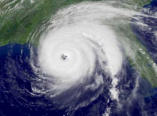
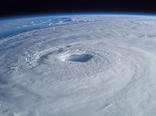
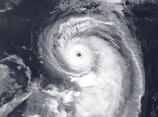
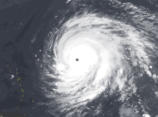
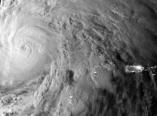
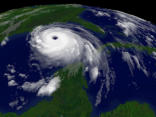
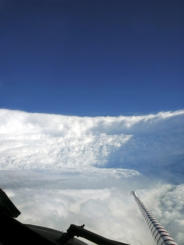


Click any picture for slideshow







There
is
an
appointed
time
for
everything.
And
there
is
a
time
for
every
event
under
heaven
—
a
time
to
give
birth,
and
a
time
to
die;
a
time
to
plant,
and
a
time
to
uproot
what
is
planted.
A
time
to
kill,
and
a
time
to
heal;
a
time
to
tear
down,
and
a
time
to
build
up.
A
time
to
weep,
and
a
time
to
laugh;
a
time
to
mourn,
and
a
time
to
dance.
A
time
to
throw
stones,
and
a
time
to
gather
stones;
a
time
to
embrace,
and
a
time
to
shun
embracing.
A
time
to
search,
and
a
time
to
give
up
as
lost;
a
time
to
keep,
and
a
time
to
throw
away.
A
time
to
tear
apart,
and
a
time
to
sew
together;
a
time
to
be
silent,
and
a
time
to
speak.
A
time
to
love,
and
a
time to hate; a time for war, and a time for peace (Ecclesiastes 3:1-8).
IN THE EYE OF THE HURRICANE
In
the
Indian
Ocean,
hurricanes
are
aptly
called
“cyclones,”
from
the
Greek
word,
kuklos
,
meaning
“circle,”
because
their
winds
rotate
around
a
center
point
known
as
“the
eye.”
If
the
eye
of
a
hurricane
moves
directly
over
a
person,
he
finds
himself
in
calm
weather.
If
he
didn’t
know
any
better,
he
might
think
that
the
calm
of
the
hurricane’s
eye
was
just
another
pleasant
day.
Yet,
the
eye
of
the
hurricane
soon
moves
on
and
he
is
hit
by
the
fierce
and
devastating
wall
of
wind
on
the
other
side.
The
calm
he
experienced
in
the
eye
proved
to
be
just
an
illusory
interlude
—
a
brief
“lull
before
the
storm.”
Therefore,
he
would
be
a
fool
to
think
that
the
calm
of
the
hurricane’s
eye
means
that
the
worst
is
over and that he may return to life as it was.
Such
is
life.
It
is
like
a
hurricane
with
its
eye.
Its
problems
come
and
go
—
and
come
again.
Life
involves
encountering
and
resolving
an
unending
series
of
problems.
Not
only
are
there
smaller
category
one
and
two
“hurricanes,”
but
there
are
the
intermediate
category
threes
and,
sometimes,
even
the
category
fours
and
fives.
When
life’s
problems
or
crises
hit,
we
move
through
the
“eye
wall”
of
a
storm
before
God,
in
His
great
mercy,
gives
us
the
calm
of
“the
eye”
to
catch
our
breath
and
prepare
to
be
hit
by
the
other
side
of
the
wall,
which
is
surely
to
come.
However,
we
might
easily
be
lulled
into
thinking,
while
enjoying
the
brief
calm
of
the
eye
that,
going
forward,
this
is
the
way
life
will
always
be
—
until
the
opposite
eye
wall
hits
and
shatters
our
delusion.
The
writer
of
Ecclesiastes
makes
this
very
point
in
the
first
few
chapters
of
his
book
when
he
reminds
us
of
the
cyclical,
repetitive
nature
of
life.
He
brings
this
point
to
a
climax
in
the
passage
which
begins
with
the
memorable
words,
“To
every
thing
there
is
a
season
…”
(Eccl.
3:1ff).
The
time
of
love
will
eventually
give way to a time to hate, and vice versa.
This
raises
two
additional
thoughts.
First,
not
only
do
the
storms
of
life
fade
as
they
yield
to
the
“eyes”
of
resolutions,
but
so
do
life’s
pleasures.
They
fade,
if
only
because
those
who
have
enjoyed
them
find
them
losing
their
novelty.
Ecclesiastes
quotes
the
old
man
as
saying
of
his
latter
days,
“I
have
no
pleasure
in
them”
(12:1).
The
writer
of
Hebrews
refers
to
the
“pleasures
of
sin”
which
last
“for
a
season.”
Life’s
pleasures
are
seasonal.
As
surely
as
they
come,
just
as
surely
they
will
go.
Those
who
are
tempted
to
trade
in
their
faith
for
the
bright
baubles
of
sin
would
do well to remember this.
Second,
life
itself
is
lived
“in
the
eye
of
the
hurricane.”
Life
is
a
series
of
alternating
storms
and
“eyes”
within
a
larger
“eye.”
A
storm
of
judgment
is
coming.
“In
whirlwind
and
storm
is
His
way”
(Nah.
1:3).
Many
who
now
live
as
if
they
were
in
the
eye
of
the
hurricane
think
that
it
will
always
be
so.
Yet,
the
writer
of
Hebrews
warns
that
“it
is
appointed
for
men
to
die
once
and
after
this
comes
the
judgment
…”
(Heb.
9:27).
Yes,
there
is
an
eternal
storm
of
condemnation
coming.
From
it
there
will
be
no
relief,
unless
it
is
first
found
in
Christ,
the
eternal
“eye
of
the
storm,”
who will give to those who seek Him its calm atmosphere forever.







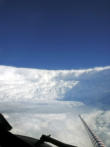

Click any picture for slideshow








